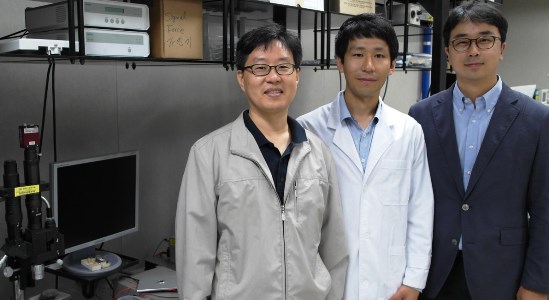Professor Taek-Soo Kim’s team from Department of Mechanical Engineering at KAIST, in conjunction with Doctor Seungmin Hyun from the Department of Nano Mechanics at Korea Institute of Machinery and Materials (KIMM), discovered a revolutionary method of tensile testing of ultra-thin films on water surfaces. Titled “Tensile Testing of Ultra-Thin Films on Water Surface,” this research was published online in Nature Communications on October 3.
The surface of water is a suitable medium for the performance of gliding movements, and this property has been much exploited by both nature and technology. Notable examples are water striders, which have the exceptional ability to “walk” on water and possess Langmuir-Blodgett films, a thin material with various biological and mechanical properties. The reason why the water surface has such properties is twofold: the high surface tension of the fluid renders the objects in contact to remain floating and its low viscosity allows objects to glide with virtually no friction.

Professor Kim’s team managed to appropriate the unique properties of the water surface so that it could serve as a platform for free-standing ultra-thin films. From this platform, new approaches for tensile testing, capable of yielding precise results, were developed. Previously, the testing of ultra-thin films was problematic because these films were susceptible to damage during testing. These new approaches, however, reduced the damage incurred to ultra-thin films and were less cumbersome to perform.
These research findings, which harness mechanical properties of various materials, have the potential to be applied in two-dimensional materials, an emerging field in semiconductor technology. Professor Kim noted, “These new research findings will facilitate the testing of materials such as graphene, a two-dimensional material whose mechanical properties were previously impossible to measure.”
Jae-Han Kim, the first author of this breakthrough publication, is a Doctor of Philosophy (more commonly referred to as Ph.D.) candidate from the Department of Mechanical Engineering. His advisor, Professor Kim, received his Ph.D. degree and worked as a Postdoctoral Research Fellow at Stanford University before joining Department of Mechanical Engineering at KAIST in 2010. Doctor Han received his Ph.D. from Lehigh University in 2002 and currently works as Senior Research Engineer for KIMM.
Min Kyu Choi
scentimentality@gmail.com

